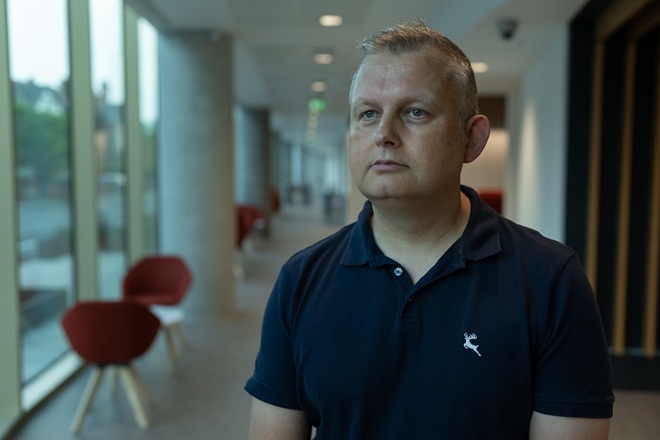Press release posted 25 October 2023
A Lancashire man whose aggressive prostate cancer was rapidly progressing through standard therapies has now been told that his cancer is close to undetectable* after just 4 months of being on a first-in-human clinical trial at The Christie NHS Foundation Trust.
Andy Willis, a 51-year-old retiree and keen photographer from Chorley, is one of only a handful of people in the world to be testing the effectiveness of a new drug in combination with an existing hormone therapy**.
The new drug, called AZD5305, is a new type of PARP inhibitor. It works by stopping damaged cancer cells from repairing themselves. Existing drugs of this type can potentially lead to patients developing anaemia because they impact the blood cells as well as the cancer cells. It is predicted that AZD5305 will only target the cancer cells, thus reducing the risk of anaemia.
Measuring the levels of PSA, a protein produced by the prostate, in the blood is one of the main ways of monitoring prostate cancer. Andy’s levels have gone from a high of 48 to 0.34 in just 4 months of treatment and his scans show no progression of the cancer.
The PETRANHA trial is sponsored by AstraZeneca and Andy is being treated at the at the National Institute for Health and Care Research (NIHR) Manchester Clinical Research Facility (CRF) at The Christie.
Andy was diagnosed in September 2021. He had no symptoms other than back pain, but his dad had died of the disease, so he wanted to get checked out. He went to his local hospital for tests and was told he had advanced prostate cancer.
Doctors at his local hospital told him he may only have a short time to live, and he chose to be referred to The Christie where he was treated with chemotherapy and hormone treatment. However, as Andy’s cancer is quite aggressive, the hormone treatment stopped working after just a few months.
When he was diagnosed, Andy received genetic testing to see if there were any targeted experimental treatments that would work for him***. Although there was nothing suitable at the time, he was later matched to the PETRANHA trial. His cancer has an ATM mutation which told the trials team that he would potentially respond well to the new PARP inhibitor.
“To be told that I may only have a short time to live and then for the treatment to stop working so soon was really scary, comments Andy. “It’s only since being on the trial that I realise how ill I was. The difference between now and then is extraordinary. I don’t only feel better physically, but my mental health has also improved. The team at The Christie has given me hope.
“I’d encourage any man in my situation to speak to their consultant and find out what’s available for them. You’re helping yourself and potentially the next generation of patients who find themselves in the same position.”

“Younger patients like Andy often have a more aggressive form of prostate cancer which progresses quickly, so to see him doing well after such a short period of time is fantastic,” comments Dr. Andrew Hudson, consultant clinical oncologist and UK chief investigator of the trial.
“To me, he represents what the future will look like for treating prostate cancer. We’ll be able to take a blood sample to give us specific genetic information about that person’s cancer. We’ll then be able to match them to a personalised treatment that specifically targets their tumour, hopefully with minimal side effects. It means that patients like Andy could have better outcomes and a better quality of life.
“I’m so proud that this research is taking place at The Christie. We were one of the first centres in the world to trial this new drug with hormone treatments for prostate cancer, and we’re also pioneering the use of blood tests to find genes, proteins and other information that can tell us all about a person’s cancer to determine what treatments will work best for them. Things are moving so quickly, so it’s a really exciting time to be working in this field.”
The Christie is a European Prostate Cancer Centre of Excellence and a Movember Centre of Excellence.
Any patients interested in taking part in clinical trials should discuss this option with their consultant or GP. Not all patients will fit the criteria for a specific trial. While clinical trials can be successful for some patients, outcomes can vary from case to case. You can read more about this on our taking part in clinical trials page.
*Andy’s PSA levels have gone from a high of 48 to 0.34 in just 4 months of treatment and his scans show no progression of the cancer. Measuring the levels of PSA, a protein produced by the prostate, in the blood is one of the main ways of monitoring prostate cancer.
**Andy is on enzalutamide, a drug which blocks the effect of testosterone on prostate cancer cells.
***This was part of another trial called TARGET. Funded by The Christie Charity, researchers looked at gene changes in advanced solid cancers and how genetic information can help doctors decide the most suitable phase one trial for people to take part in.
